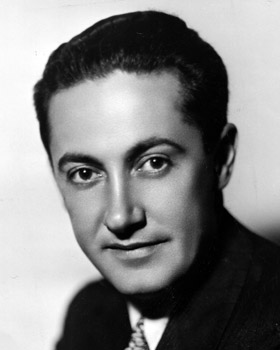Irving Thalberg facts for kids
Quick facts for kids
Irving Thalberg
|
|
|---|---|

Irving Thalberg, c. 1930s
|
|
| Born |
Irving Grant Thalberg
30 May 1899 Brooklyn, New York, U.S.
|
| Died | September 14, 1936 (aged 37) Santa Monica, California, U.S.
|
| Cause of death | Pneumonia |
| Resting place | Forest Lawn Memorial Park, Glendale, California |
| Nationality | American |
| Occupation | Film producer |
| Years active | 1921–1936 |
| Spouse(s) | |
| Children | Irving Thalberg, Jr. (1930–1987) Katherine Thalberg (1935–2006) |
Irving Grant Thalberg (May 30, 1899 – September 14, 1936) was a very important American film producer. He worked during the early days of movies. People called him "The Boy Wonder" because he was so young and good at making successful films. He was great at choosing stories, picking actors, and putting together the film crew.
Some of his famous movies include Grand Hotel, China Seas, Camille, Mutiny on the Bounty, and The Good Earth. His films were popular all over the world. They showed an exciting image of American life, full of energy and freedom.
Irving was born in Brooklyn, New York. As a child, he had a serious heart condition. Doctors thought he might not live past age thirty. After high school, he worked in a store. He also took night classes to learn typing. Later, he became a secretary at Universal Studios in New York. He then moved to Los Angeles to manage their studio. There, he helped make about 100 films in three years. One of these was The Hunchback of Notre Dame.
In Los Angeles, he teamed up with Louis B. Mayer. Their studio later joined with two others to create Metro-Goldwyn-Mayer (MGM). In 1925, at just 26 years old, Irving became the head of production at MGM. He helped MGM become the most successful movie studio in Hollywood.
During his 12 years at MGM, he produced 400 films. He brought many new ideas to filmmaking. He held meetings with writers to discuss stories. He used "sneak previews" to get early feedback from audiences. He also often re-shot scenes to make films better. He even helped create the "Production Code". These were rules for what was considered morally acceptable in movies. Irving also helped bring stage plays and classic books to the big screen.
Contents
Irving Thalberg's Death
In 1936, Irving and his wife, Norma Shearer, went on a short vacation. They stayed at a hotel in Monterey, California. A few weeks before, a writer suggested making a movie based on a book called Gone With the Wind. Irving thought it would be a "sensational" movie. But he decided not to do it. He said he was too tired after making big films like Mutiny on the Bounty and The Good Earth. He also believed that Civil War movies never made much money.
Soon after returning home, Irving became very sick with pneumonia. His health got worse quickly. He needed an oxygen tent to help him breathe. He passed away the next morning at age 37.
When the news spread, the MGM studio was very sad. Work stopped, and many people cried. Stars, writers, directors, and other employees felt a great loss. They had all worked with him.
His funeral was held two days later. Other Hollywood studios stopped work for five minutes to honor him. The MGM studio closed for the entire day. Many famous people attended his funeral. These included Greta Garbo, Jean Harlow, the Marx Brothers, Charlie Chaplin, Walt Disney, and Mary Pickford. Clark Gable and Fredric March were among the ushers.
Irving Thalberg is buried in a special tomb in Forest Lawn Memorial Park in Glendale, California. His wife, Norma Shearer, had his tomb engraved with "My Sweetheart Forever."
Many people shared their thoughts about Irving after he died. Louis B. Mayer, his partner at MGM, said he had lost "the finest friend." Other studio leaders also praised his talent and vision. President Franklin D. Roosevelt said, "The world of art is poorer with the passing of Irving Thalberg."
Irving Thalberg's Legacy
One of the greatest friends a man could have; one of the greatest creative minds the world has ever produced; the greatest leader our industry has ever had. No words can express either my own personal grief, nor the grief that I know all of us who owe so much to him can express.
I can think of no one in our industry who does not owe Irving Thalberg a deep debt of gratitude. I can can think of no one in the world to whom his passing is not a loss.
actor Lionel Barrymore
Irving Thalberg's impact on the movie industry was huge. He introduced many new ways of making films. He often turned classic books and stage plays into popular movies. Because of him, American movies were very successful around the world for many years. Darryl F. Zanuck, who started 20th Century Fox, called him the "most creative producer in the history of films."
Most of MGM's big movies in the 1930s were shaped by Thalberg. He closely watched the making of more movies than any other producer in Hollywood. He was seen as the perfect example of a creative producer. After he died, The New York Times newspaper called him the "most important force" in the movie industry. They said he "set the pace and others followed" because his way brought together style, glamour, and profit.
Thalberg never took credit for his work as a producer. His name never appeared on screen while he was alive. He believed that "credit you give yourself is not worth having." His last film, The Good Earth (1937), was released after he passed away. It won many awards. The movie's opening screen credit was dedicated to him:
To the Memory of Irving Grant Thalberg – we dedicate this picture – his last great achievement.
In 1938, a new building at MGM in Culver City was named after Thalberg. The Irving G. Thalberg Memorial Award is also named for him. This award honors producers who consistently make excellent films.
Films Produced by Irving Thalberg
- Reputation (1921)
- The Hunchback of Notre Dame (1923)
- Merry-Go-Round (1923)
- His Hour (1924)
- He Who Gets Slapped (1924)
- The Unholy Three (1925)
- The Merry Widow (1925)
- The Tower of Lies (1925)
- The Big Parade (1925)
- Ben-Hur: A Tale of the Christ (1925)
- Torrent (1926)
- La Bohème (1926)
- Brown of Harvard (1926)
- The Road to Mandalay (1926)
- The Temptress (1926)
- Valencia (1926)
- Flesh and the Devil (1926)
- Twelve Miles Out (1927)
- The Student Prince in Old Heidelberg (1927)
- London After Midnight (1927)
- The Crowd (1928)
- Laugh, Clown, Laugh (1928)
- White Shadows in the South Seas (1928)
- Show People (1928)
- West of Zanzibar (1928)
- The Broadway Melody (1929)
- The Trial of Mary Dugan (1929)
- Voice of the City (1929)
- Where East Is East (1929)
- The Last of Mrs. Cheyney (1929)
- The Hollywood Revue of 1929 (1929)
- Hallelujah! (1929)
- His Glorious Night (1929)
- The Kiss (1929)
- Anna Christie (1930)
- Redemption (1930)
- The Divorcee (1930)
- The Rogue Song (1930)
- The Big House (1930)
- The Unholy Three (1930)
- Let Us Be Gay (1930)
- Billy the Kid (1930)
- Way for a Sailor (1930)
- A Lady's Morals (1930)
- Inspiration (1931)
- Trader Horn (1931)
- The Secret Six (1931)
- A Free Soul (1931)
- Menschen hinter Gittern (1931), German-language version of The Big House (1930)
- The Sin of Madelon Claudet (1931)
- The Guardsman (1931)
- The Champ (1931)
- Possessed (1931)
- Private Lives (1931)
- Mata Hari (1931)
- Freaks (1932)
- Tarzan the Ape Man (1932)
- Grand Hotel (1932)
- Letty Lynton (1932)
- As You Desire Me (1932)
- Red-Headed Woman (1932)
- Smilin' Through (1932)
- Red Dust (1932)
- Rasputin and the Empress (1932)
- Strange Interlude (1932)
- Tugboat Annie (1933)
- Eskimo (1933)
- La Veuve Joyeuse (1934) French-language version of The Merry Widow
- Riptide (1934)
- The Barretts of Wimpole Street (1934)
- The Merry Widow (1934)
- What Every Woman Knows (1934)
- Biography of a Bachelor Girl (1935)
- No More Ladies (1935)
- China Seas (1935)
- Mutiny on the Bounty (1935)
- A Night at the Opera (1935)
- Riffraff (1936)
- Romeo and Juliet (1936)
- Camille (1936)
- Maytime (1937)
- A Day at the Races (1937)
- Broadway Melody of 1938 (1937)
- The Good Earth (1937)
- Marie Antoinette (1938)
Images for kids
-
Thalberg (left) with wife Norma Shearer, and Louis B. Mayer, 1932
See also
 In Spanish: Irving Thalberg para niños
In Spanish: Irving Thalberg para niños
 | Aaron Henry |
 | T. R. M. Howard |
 | Jesse Jackson |







